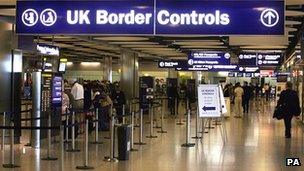Migration to UK more than double government target
- Published

The most common reason for people coming to the UK remains to study
Net migration to the UK remains more than double the government's target of fewer than 100,000 people a year, according to new figures.
In the 12 months to last September, net migration - the number arriving in the UK to stay for more than a year minus those leaving for good - was 252,000.
The figures reflect a drop of just 3,000 on the previous year.
The government has pledged to cut it to "tens of thousands" by 2015 and Labour said it was "failing badly".
Student visas
The figures from the Office for National Statistics show estimated long-term immigration to the UK in the year to September was 589,000, compared with 600,000 in the year to September 2010. The figure has remained at a similar level since 2004.
Estimated long-term emigration from the country over the same 12 months was 338,000, compared with 345,000 for the year before.
The number of National Insurance numbers allocated to non-UK nationals in the year to December 2011 was 671,000, a rise of 1% compared with 2010.
The most common reason for people coming to the UK is to study, as in previous years. This accounted for 250,000 of the arrivals, up slightly from 245,000 in the year to September 2010.
But the government said there had been a drop in the number of student visas issued in the first few months of this year.
Immigration Minister Damian Green said: "Our tough new rules are now making a real difference with a record 62% drop in student visas in the first quarter of 2012, and overall falls in work visas, family numbers and people settling."
Last November the government's migration advisers recommended changes aimed at cutting the number of family visas issued by up to two-thirds. They included an increase in the amount a UK resident would have to earn before a partner from overseas was granted a visa.
'Weak controls'
"As these policies start to bite we are seeing an end to the years when net migration was consistently on the rise," Mr Green said.
"But the hangover from the old system of weak controls means it is still too high and we will continue our programme of reforms to bring net migration down from the hundreds of thousands to the tens of thousands."
But Shadow Home Secretary Yvette Cooper said the government was "failing badly on its own immigration target".
She said: "David Cameron said 12 months ago, 'No ifs. No buts. That's a promise we made to the British people.'
"Yet these figures show that promise is being broken and the net migration figure of 252,000 is barely changed in the last two years, even with the net rise in British citizens leaving the UK.
"Migration experts have said the government does not have the policies to deliver on the target, so the prime minister is not being straight with the public on immigration. He should not make promises he can't keep on such an important policy area."
Dr Martin Ruhs of Oxford University's Migration Observatory said: "Work, family and 'other' migration from outside the EU are at a very similar level to where they were in 2000, but non-EU students coming to the UK have increased substantially, which has been a big contributor to the challenges that the Government faces in hitting its target. "
'Unacceptable scale'
The Institute for Public Policy Research, a left-of-centre think tank, has criticised the government's attempt to cut the number of student visas, <link> <caption>claiming it will damage the UK higher education industry for the sake of the migration figures</caption> <url href="http://www.ippr.org/publication/55/8997/international-students-and-net-migration-in-the-uk" platform="highweb"/> </link> .
Its associate director Sarah Mulley said: "The government has so far made no progress towards meeting its target of reducing net migration to less than 100,000."
Migration Watch UK, a think tank which campaigns for tighter immigration controls, said it was worried by the figures.
Chairman Sir Andrew Green said: "You cannot expect to repair 15 years of mismanagement in 15 months, but it is still worrying news that net migration is running at a quarter of a million a year.
"There is no sign of any reduction from the huge numbers that developed under Labour.
"The problem is that non-EU migrants are simply not leaving. It is time the Lib Dems understood the extent of public concern, including among 75% of their own supporters.
"The coalition must now take tough measures to reduce this unacceptable scale of immigration."
- Published23 February 2012
- Published24 November 2011
- Published16 November 2011
- Published14 April 2011